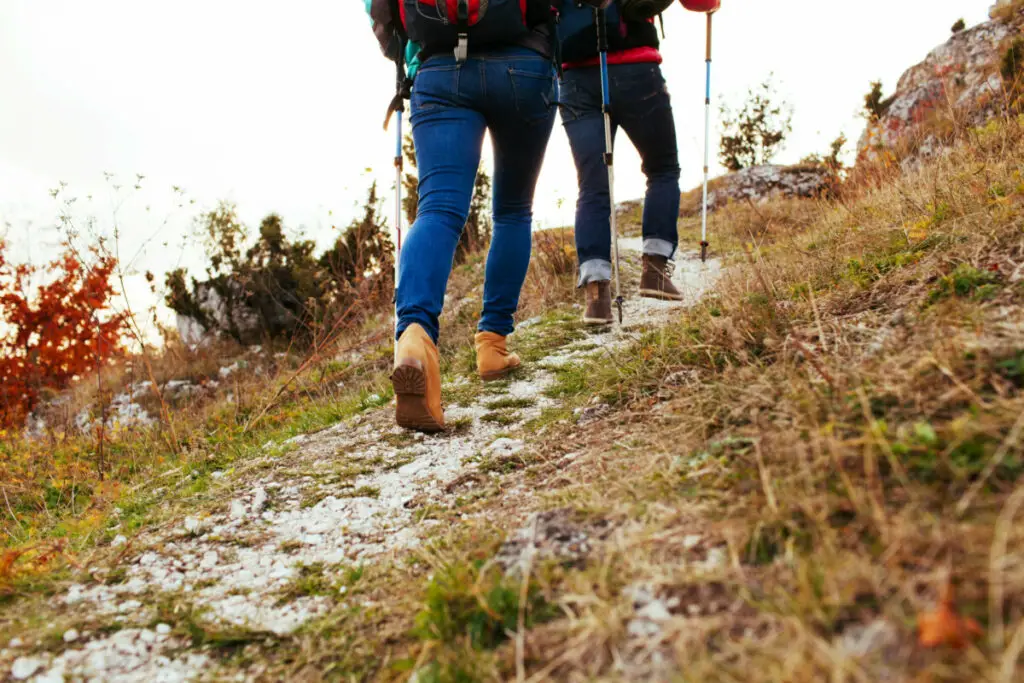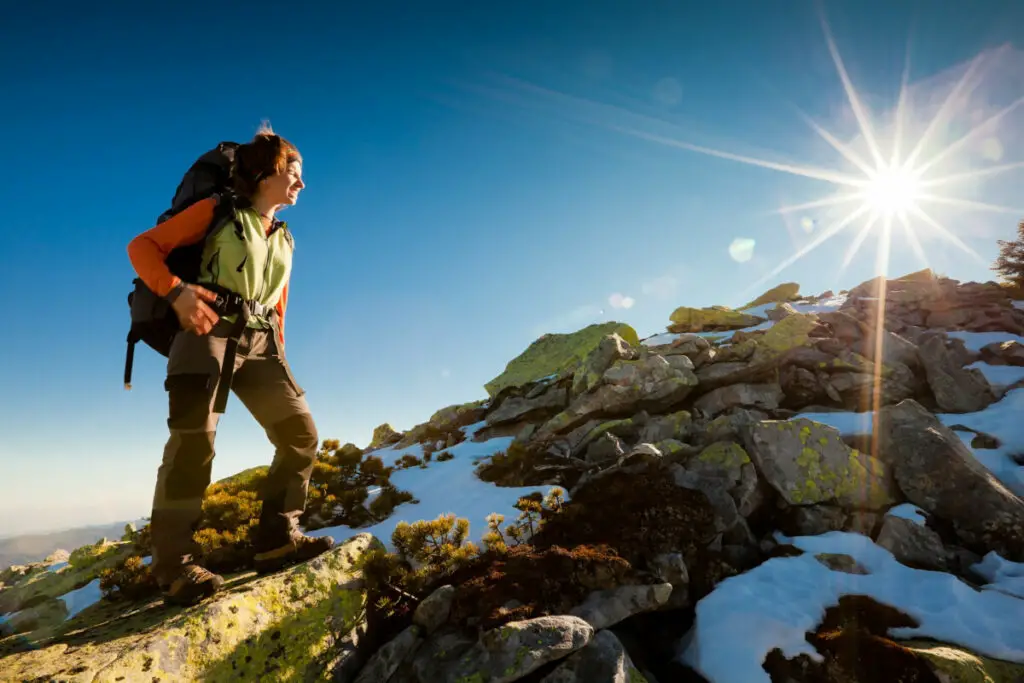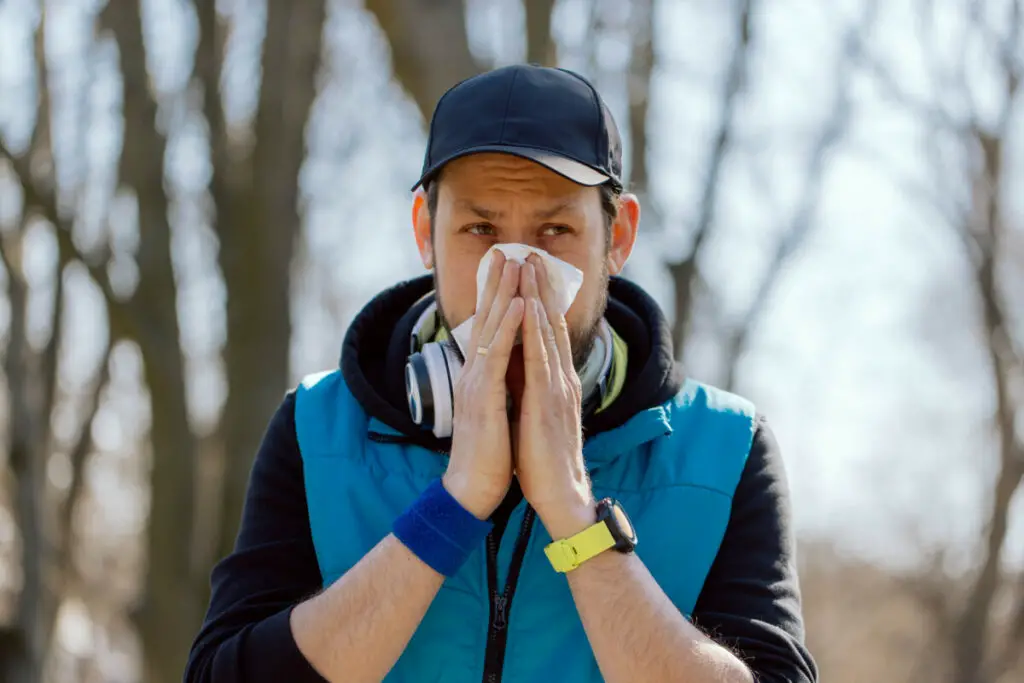
Do you often get a runny nose while hiking or enjoying some type of outdoor exercise? If so, you are probably wondering why this keeps happening to you and whether or not it’s something you should be worried about. Here’s the simple answer as to why your nose might start to run while you’re out on a hike.
Many people experience a runny nose while hiking or participating in other types of cardiovascular activities outdoors. This is often due to exercise-induced rhinitis, also known as runner’s rhinitis. This type of runny nose can also be caused by allergies, cold weather, or altitude sickness.
We are anticipating that you still have some questions regarding your runny noses, so keep reading below to find out more about what might be causing it, how to handle this type of minor hiking distraction, and more!
What is Causing My Nose to Run?

There are a few main offenders that are likely causing your nose to run. Here’s a list that gets to the bottom of each of these common causes of runny noses that might be giving you grief on your hikes:
Runners Rhinitis – The first thing you should know is that a runny nose is not an uncommon occurrence to accompany any type of outdoor physical activity. Exercise causes your heart rate to increase, which causes you to breathe quicker. This type of mild hyperventilation causes you to breathe in more air through your nose, which can dry it out and make it run. This is known as exercise-induced rhinitis or runner’s rhinitis.
Allergies – Allergies are another one of the common causes of a runny nose. When you’re outdoors, there are all sorts of pollens, grasses, and danders that could be causing you to have an allergic reaction that manifests itself as a runny nose. The allergens cause your nasal passages to become inflamed and produce more mucus, which is clear and watery. If allergies are causing your runny nose, you might consider taking an antihistamine to help your nose keep cool while on outdoor hikes.
Cold Weather – Another culprit guilty of causing a runny nose is cold air and weather. When it’s cold outside, your body starts to produce more mucus in order to protect your mucus membranes.
Altitude Sickness – Altitude sickness is another albeit less common cause of runny noses. The low humidity of high altitudes dries out the membranes of your nose. As a result, those experiencing adjusting to a higher altitude might experience a runny nose or nosebleeds.
How Do I Stop My Nose From Running While I Hike?
Drink Lots of Water – One of the best and easiest ways to prevent a runny nose is to avoid dehydration and drink lots of water. Having more water in your system will help the mucus in your nose to be less dry. Having a dry nose is what lets the excess nasal drainage flow out of your nasal cavities, creating what we know to be a “runny nose.”
Use a Nasal Saline Rinse – If you find yourself with an irritated or runny nose while on a hike, you can use a saline rinse to clear out your nose of any mucus, allergens, bacteria, or viruses that may have gotten trapped up there.
Blow Your Nose – It’s an easy fix. Sometimes you can force all the nasal drainage out in one blow. If you bring a little pack of tissues with you in your hiking pack, you may be able to take care of your nasal nuisance in a matter of seconds. Just remember to blow out of one nostril at a time, so the mucus can escape your sinuses. Also, be sure to leave no trace and store the dirty tissue in your pocket or bag until you find a garbage can for it!

Keep Your Head Elevated – Keeping your head propped up will help clear your nasal passages. If you are on a camping or backpacking trip dealing with a runny nose from a day of hiking, it is a good idea to keep your head propped up as you sleep so that your nasal passages can clear out properly.
Keep Your Face Warm – Another way to keep a runny nose away is to make sure your nose and mouth are staying warm while you hike. You can achieve this by wearing a scarf, balaclava, or neck gaiter.
“Hike” Indoors – If runny noses are taking some of the enjoyment out of your hikes and you think they might be caused by cold weather, you might consider walking on an inclined treadmill instead until the weather gets warmer. You could also avoid the cold morning air and save your hike for a warmer time of the day.
Should I Be Worried About My Runny Nose?
Since runny noses are so common for those who engage in outdoor exercise, it’s not a huge reason for concern. As long as you make sure that you are staying hydrated or taking any necessary allergy medications, there’s no need to panic about a runny nose making an appearance while on a hike.
What If My Runny Nose Doesn’t Go Away? – If you find that your runny nose keeps bugging you and won’t seem to go away long after your hike has ended, you should contact a doctor about getting on an antibiotic, since you could be at risk of contracting a bacterial infection. You might also consider placing nasal strips on your nose before you go to bed. These strips will help widen your nasal passages as you sleep, which will help clear out any congestion.
Be Prepared
Having plenty of water, a few tissues, and a neck gaiter on hand while you hike can make a huge difference in helping you prevent or get rid of something as simple yet annoying as a runny nose. Being prepared will make your hike more enjoyable overall, so if you are a common victim of a runny nose while engaging in outdoor physical activity, it’s a good idea to have these things on hand.
Do you know of any other quick fixes to help stop a runny nose in a pinch? Let us know in the comments!

